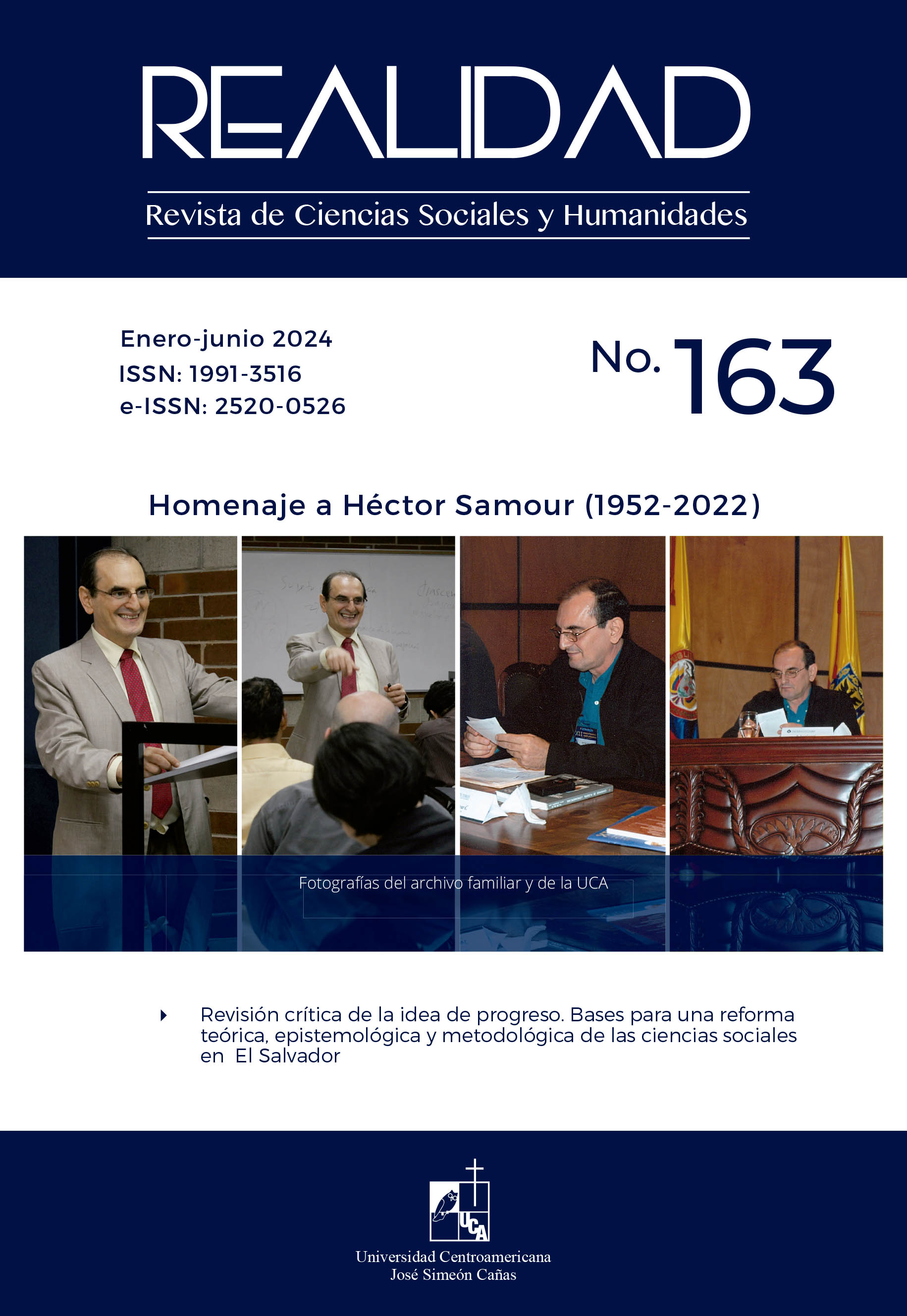Abstract
This work gathers Bruno Latour’s critique of modernity and the idea of progress, giving special attention to his critique of modern science and the separation it carries out between nature and society. From these perspective, two concrete cases are analyzed that show the prevalence of this conception in current social science: the claims to the technical treatment of the coronavirus pandemic and the purely technical analysis of the water resource. In the first case, it is emphasized that the pandemic is also a political problem; in the second, that the water problem also has political and social implications.
Realidad: Revista de Ciencias Sociales y Humanidades No. 163, 2024: 106-124.
References
Astorga Espeleto, Y. (2013), Guía para la aplicación de la gestión integrada del recurso hídrico (GIRH) a nivel municipal, Global Water Partnership.
Couture-Grondin, É. (2011). Repensar las relaciones interculturales a partir de Bruno Latour, Boaventura de Sousa Santos y Donna Haraway, Tinkuy 16, 7-26. https://dialnet.unirioja.es/servlet/articulo?codigo=3728584
Cruz Castillo, A. (2015). Bruno Latour y el estudio de lo social: construcción y actuación en red. Revista Lebret, (7), 63-76. https://doi.org/https://doi.org/10.15332/rl.v0i7.1519
De Grande, P. (2013). Constructivismo y sociología. Siete tesis de Bruno Latour. Revista MAD, 29, 48-57. https://doi.org/10.5354/rmad.v0i29.27345
Departamento de Asuntos Económicos y Sociales de las Naciones Unidas (ONU-DAES). (2014). Decenio internacional para la acción. “El agua, fuente de vida”, 2005-2015. https://www.un.org/spanish/waterforlifedecade/iwrm.shtml
Dimas, L. (2006). Agua: recurso estratégico para nuestro crecimiento económico y progreso social. Situación y desafíos. FUSADES.
Dimas, L. (2013). Recursos hídricos en El Salvador: importancia, gestión y participación, FUSADES.
Ellacuría, I. (1990). Filosofía de la realidad histórica. UCA Editores.
Gertenbach, L. y Laux, H. (2019). Zur Aktualität von Bruno Latour. Einführung in sein Werk, Springer.
Gilligan, J. (2000). Violence in public health and preventive medicine, The Lancet, 355, (9217),1802-1812. https://doi.org/10.1016/S0140-6736(00)02307-2
Glavich, Eduardo (1995). Reseña de “Nunca hemos sido modernos. Ensayo de antropología simétrica” de Bruno Latour. Redes, 2, (3), 208-212. https://www.redalyc.org/articulo.oa?id=90711280009
Goldmann, L. (2013). The Hidden God. A study of tragic vision in the Pensées of Pascal and the Tragedies of Racine. Routledge.
González, A. (1995), Un solo mundo. La relevancia de Zubiri para la teoría social (Tesis doctoral), Universidad Pontificia de Comillas.
Gudynas, E. (2004). Ecología, economía y ética del desarrollo sostenible. CLAES.
Gudynas, E. (2011). Buen vivir. Germinando alternativas al desarrollo. América Latina en Movimiento, ALAI (462), 1-20.
Guzmán, V. (2020). “El objetivo general del Hospital El Salvador no se cumplió”. El Faro. https://elfaro.net/es/202008/el_salvador/24733/%E2%80%9CEl-objetivo-general-delHospital-El-Salvador-no-se-cumpli%C3%B3%E2%80%9D.htm
Habermas, J. (1989). El discurso filosófico de la modernidad, Taurus.
Harman, G. (2009). Prince of networks. Bruno Latour and metaphysics. re.press.
Harman, Graham (2014) Bruno Latour. Reassembling the political. Pluto Press.
Latour, B. (1979). Laboratory life. The construction of scientific facts, Princeton.
Latour, B. (1992). Ciencia en acción. Labor.
Latour, B. (1995). ¿Tienen historia los objetos? El encuentro de Pasteur y de Whitehead en un baño de ácido láctico. Isegoría, (12), 92–109. https://doi.org/10.3989/isegoria.1995.i12.242
Latour, B. (2001) La esperanza de Pandora. Ensayos sobre la realidad de los estudios de la ciencia, Gedisa.
Latour, B. (2004). Politics of Nature. Harvard University Press.
Latour, B. (2007). Nunca fuimo modernos. Siglo XXI Editores.
Latour, B. (2008). Reensamblar lo social, Manantial.
Latour, B. (2010). On the Modern Cult of the Factish Gods. Duke University Press.
Latour, B. (2012). Cogitamus. Seis cartas sobre las humanidades científicas, Paidós.
Latour, B. (2016), Lecciones de sociología de la ciencia. Arpa.
Latour, B. (2018). Down to Earth. Politics in the New Climatic Regime, Polity.
Latour, B., Schaffer, S y Gagliardi, P. (2020). A book of body politics, Fondazione Giorgio Cini.
Marx, K. (2008). Manifiesto del partido comunista. Herramienta Ediciones.
Pinker, Steven (2018). En defensa de la ilustración, Paidós.
Santos, B. (2006). Conocer desde el Sur. Para una cultura política emancipatoria, Fondo Editorial de la Facultad de Ciencias Sociales.
Santos, B. (2014). Epistemologías del Sur. Akal.
Schmidgen, H. (2015). Bruno Latour in pieces. An intellectual biography. Fordham University Press.
Stengers, I. (2000), The invention of modern science. University of Minnesota Press.
Stengers, I. (2011). Thinking with Whitehead. Harvard University Press.
Stengers, I. (2018) Another science is possible. A manifesto for slow science. Polity.
Vries, G. (2016). Bruno Latour. Polity Press.
Zubiri, X. (1974). Naturaleza, Historia y Dios. Alianza Editorial.

This work is licensed under a Creative Commons Attribution-NonCommercial 4.0 International License.
Copyright (c) 2024 Luis Antonio Monterrosa






